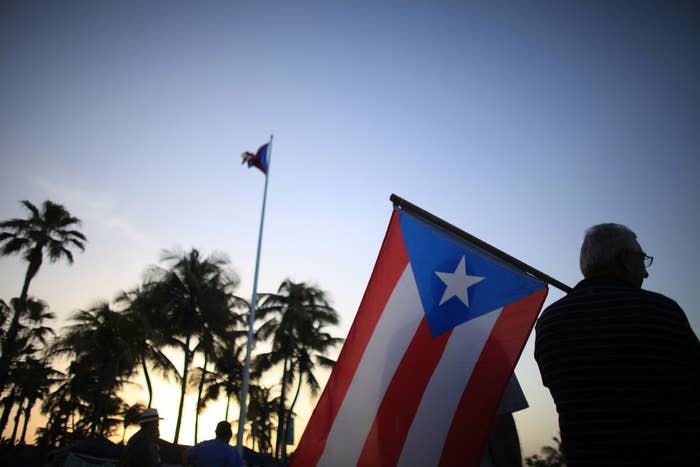
Democrats and a coalition of patient advocates, insurance companies, and labor unions are urging the Obama administration to intervene after funding for a Medicare program that benefits the elderly and disabled in Puerto Rico was reduced, a move they warn will deal a blow to the island's already wounded economy.
In April, an agency within the United States Department of Health and Human Services announced the payment structure for the Medicare Advantage program. The Puerto Rico Healthcare Crisis Coalition said the calculations slash program premiums by 11% on the island while increasing them by about 3% for those on the mainland, compared with the previous year.
The Centers for Medicare & Medicaid Services, which sets the rates for the Medicare program run by private insurers, declined to confirm the calculations.
Dennis Rivera, chairman of the coalition, told BuzzFeed News the unjust cuts jeopardized the well-being of Puerto Ricans and hurt the territory's struggling economy. Unemployment in Puerto Rico stands at about 11.8%, compounded by a debt of about $72 billion.
Puerto Rico's health care system, which makes up about 20% of the island's gross domestic product, faces a $500 million hit as a result, Rivera said. Some 2.3 million people — about 60% of Puerto Rico's population — are enrolled in Medicare, Medicare Advantage, or Medicaid.
"We pay the same Social Security and Medicare taxes but get less than everyone else," Rivera said.
The coalition launched a near-$1 million ad campaign in the D.C. and Baltimore region calling on Obama to increase funding to the Medicare Advantage program. The cuts, television spots warn, would hurt Puerto Rico's entire health care system and bring about its "imminent collapse."
Analysts, however, believe the coalition's concerns have less to do with patients and more to do with the money health care providers are going to receive from health insurance.
The cuts stem from the Affordable Care Act, which called for a reduction to Medicare by about $716 billion between 2013 and 2022. An analysis from PolitiFact found that while Medicare spending will continue to increase, the Affordable Care Act will slow its expected growth by reducing funding to Medicare Advantage, which falls onto insurance companies and hospitals, not beneficiaries.
Andrew Schwab, a senior legislative representative for AARP, said the federal government was paying 14% more for the same services in Medicare Advantage than it was for Medicare. The Affordable Care Act cut funding as a way to align costs between the two.
The payments don't affect beneficiaries, Schwab said; rather, they reduce the payments the government was making to insurance companies.
"I would suspect [health providers] are concerned that health insurance companies are going to limit or reduce the amount of money they pay them for services," Schwab said of the Puerto Rico campaign. "But the idea that there's a business battle between providers and insurance companies certainly predates the Affordable Care Act."
Still, the island's Medicare Advantage is already paid 60% of the average rate in the states, said the Puerto Rico Healthcare Crisis Coalition. This comes amid a brain drain in Puerto Rico driven by an eight-year recession.
Doctors, seeking higher pay and better reimbursement from insurers, are leaving the U.S. territory for the mainland. The Wall Street Journal reported that data from the University of Puerto Rico's School of Medicine shows that roughly 30% of its residents leave the island once they complete their training, particularly among those specializing in family medicine, obstetrics, and gynecology.
Rivera said the Department of Health made the disproportionate cuts, which affect about 560,000 Puerto Ricans enrolled in the program, because they believed there would be no consequences.
"There are no senators, congressmen in the U.S. advocating for them," Rivera said. "This campaign is a call for national unity in Puerto Rico and the U.S."
The U.S. territory has a non-voting delegate in the House of Representatives called the resident commissioner, a title currently held by Pedro Pierluisi. Puerto Rico doesn't have any senators in Congress.
Rep. Nydia Velazquez, a New York Democrat seen as a leader in the Puerto Rican community, also denounced the proposed cuts.
"Puerto Rico can no longer bear the burden of inequality from unconscionable federal cuts to essential services," Velazquez said in a statement. "Access to quality healthcare is not a privilege; it is a right for every American. "
In a statement, Rep. Pierluis said he was disappointed the Centers for Medicare & Medicaid Services didn't change its rates for Puerto Rico even after he provided the agency with data to justify them.
Officials with the Centers for Medicare & Medicaid Services told BuzzFeed News it received a number of comments regarding the rates but that in most cases the agency determined it did not have the legal authority to make those changes. It declined to state who had the authority to make those changes.
